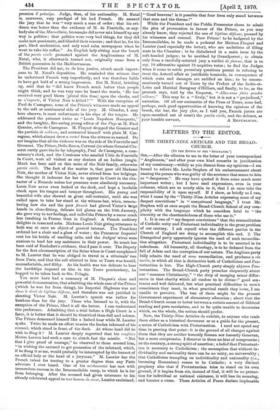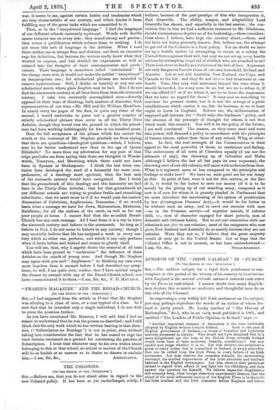LETTERS TO THE EDITOR.
THE THIRTY-NINE ARTICLES AND THE BROAD- CHURCH.
[TO THE EDITOR OF THE "SPECTATOR."]
SIR,—After the allusion to me in the letter of your correspondent " Anglicanus," and after your own kind remarks in justification of my consistency—widely as you dissent from my opinions—I am bound to relieve Mr. Leslie Stephen of his embarrassment about naming the person who was guilty of the sentence that seems to him so " dangerous." He may have quoted it from some much more important writer ; but I have used expressions, even in your columns, which are so nearly akin to it, that I at once take the responsibility of it upon myself. If I show, as briefly as I can, what I mean by the "Thirty-Nine Articles expressing some of my deepest convictions" in " unequivocal language," I trust Mr. Stephen will at once acquit the Broad-Church School of any com- plicity with the language which he considers fatal to the sincerity or the clearheadedness of those who use it."
1. It is one of " my deepest convictions" that the reconciliation of Catholic unity and Protestant individuality is the great problem of our century. I ask myself what the different parties in the Church of England are doing to accomplish this end. 2. The Evangelical party apparently ignores the need of such reconcilia- tion altogether. Protestant individuality is to be asserted in its nakedness. All humanity, all theology, is to be deduced from the fall of Adam and the corruption of our nature. The Anglican party fully admits the need of some reconciliation, and produces a via media, in which all that is distinctive both of Catholicism and Pro- testantism is lost. The High-Church party simply abjures Pro- testantism. The Broad-Church party preaches eloquently about our " common Christianity," " the duty of merging minor differ- ences in that charity which all confess to be divine :" good sen- tences and well delivered, but what practical difficulties in men's consciences they meet, in what practical result they issue, I am unable to perceive. The test of them might be the present Government experiment of elementary education ; about that the Broad-Church seems to hover between a certain amount of Biblical reading and pure secularism, and to be quite unable to determine which, on the whole, the nation should prefer.
Now, the Thirty-Nine Articles do exhibit, to anyone who reads them either as a historical document or as a guide for the present, a union of Catholicism with Protestantism. I need not spend any time in proving that point: it is the ground of all charges against them that they are neither honestly Roman nor honestly Genevan, but a mere compromise. I discover in them no hint of compromise ; on the contrary, a strong spirit of assertion ; a belief that Protestant- ism is necessary to Catholicism ; the assumption that without in- dividuality and nationality there can be no unity, no universality ; that Catholicism trampling on individuality and nationality (i.e., becoming Romanism) ceases to be Catholic ; a very distinct prophecy also that if Protestantism tries to stand on its own ground, if it begins from sin, instead of God, it will be no protec- tion for individual or national existence, it will lose its meaning, and become a curse. These Articles of Peace declare implacable
war, it seems to me, against certain habits and tendencies which are very characteristic of our century, and which binder it from fulfilling any of the great tasks which are committed to it.
Then, as to the " unequivocal language." I find the languages of our different schools eminently equivocal. Words with double senses torment one on every side ; they sound strong and precise ; then comes a qualification which reduces them to nothing. I do not trace this sort of language in the Articles. What I read there strikes me as always firm and distinct, not from an excessive rage for definition, but because the writers really knew what they wanted to express, and had studied the expressions as well as entered into the thoughts of their contemporaries and prede- cessors. Their language is sometimes called " scholastical." If the charge were true, it would not make the epithet "unequivocal" an inappropriate one ; for scholastical phrases are intended to remove equivocations. Still, I dislike as heartily as any one can scholastical words where plain English may be had. But I do not find the nineteenth century at all freer from them than the sixteenth century. I take two eminently accomplished men—directly opposed in their ways of thinking, both masters of discourse, both representatives of our time —Mr. Mill and Sir William Hamilton. In nearly every ten pages of the first, in quite any three of the second, I would undertake to point out a greater number of strictly scholastical phrases than occur in all the Thirty-Nine Articles, though they travel over the ground in which the school- men had been working indefatigably for five or six hundred years.
Does the fall acceptance of the phrase which has moved the wrath or the contempt of Mr. Stephen preclude me from saying that there are questions—theological questions—which, I believe, may be far better understood now than in the age of Queen Elizabeth? No more than my admiration for any poet of that reign precludes me from saying that there are thoughts in Words- worth, Tennyson, and Browning which there could not have been in Spenser or Shakespeare. I think the last three cen- turies have developed the need of a humanity far more com- prehensive, of a theology more spiritual, than the best men of the sixteenth century would have recognized. But I think that the groundwork of this theology and this humanity are laid bare in the Thirty-Nine Articles ; that for that groundwork all our different schools are trying to produce feeble and crumbling substitutes ; that we must recur to it if we would pass the narrow dimensions of Calvinism, Anglicanism, Romani= ; if we would learn what a message we have for Jews, Mahometans, Brahmins, Buddhists ; for all the nations of the earth, as well as for our poor people at home. I cannot find that the so-called Broad- Church has any such message. All I hear from it is a cry to leave the sixteenth century and believe in the nineteenth. So long as I believe in God, I do not mean to believe in any century; though I may earnestly believe that He has assigned a work to every cen- tury which no other can perform, and which it can only perform when it looks before and behind and ceases to glorify itself.
You will see, then, why I eagerly desire the removal of all teats which have been proved to " undermine " the influence of these Articles on the minds of young men. And though Mr. Stephen may agree with you and " Anglicanus " in thinking my case even more hopeless than it seemed before I had described my symp- toms, he will, I am quite sure, confess that I have neither caught the disease by contact with any of the Broad-Church school, nor have communicated it to them.—I am, Sir, &c., F. D. MAURICE.



































 Previous page
Previous page